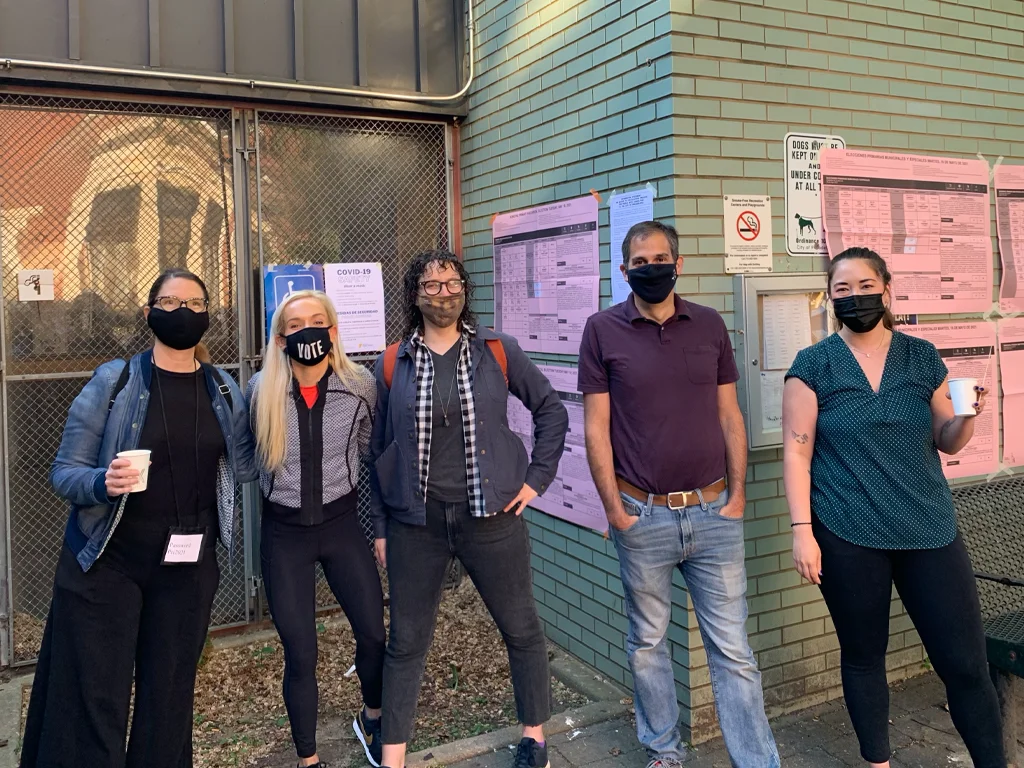Special Projects Director Jeff Barg felt the patriotic pull to serve as an election inspector in Philadelphia. His first day on the job went smoothly—sort of.

It was 7 a.m., I was surrounded by nearly two dozen of my most civic-minded neighbors, and we were locked out.
As the minutes ticked by, I thought, “Wow. My first day as a poll worker and I’m already failing.”
Across Pennsylvania, polls open at 7 sharp. But at Palumbo Rec Center in Philadelphia, where I was recruited by our committeeperson (who happens to be my spouse; she’s persuasive like that) to fill a post as majority election inspector—the official name for one of the people who checks in voters and makes sure they can vote—no one had yet shown up to let us into the building.
Once you get inside, it’s not like you can just click the lights on and start casting ballots. My fellow poll workers and I watched a highly detailed training video on every step to follow, after which there was a pop quiz that shocked me back to college.
But we did what we could curbside—swearing each other in, organizing materials, frantically phoning the city commissioners—so that when the doors finally opened a little after 7:20, we could quickly set up the polls and get our neighbors voting before 8 a.m.
Almost an hour late. Not our fault, but still: oops.
Once we got over the initial stress of not opening our polls on time, the following 13 hours were, frankly, a delight of continual neighborhood camaraderie and small talk about politics (pro), Mister Softee (anti), and Brood X cicadas (terrified).
Our division—the smallest level of political jurisdiction in Philadelphia, which is divided into 1,703 divisions—had a small but mighty crew of five poll workers: a health engagement executive, a graphic designer, an HR technologist, a dramatist and me. Two of us had never worked the polls before, and yet we quickly jelled into a well-oiled machine—checking in voters, setting them up on the swanky touchscreen machines (which still confuse the hell out of some people), logging voters, and dealing with complicated processes like ballot spoiling and provisional voting.

We didn’t get our first ballot spoil till later in the day, and when we did, it felt like a frantic scramble to follow the labyrinthine steps (X out the mail-in ballot, sign a bunch of papers, affix the proper stickers, put it in the right envelope, spell the alphabet backwards, hula hoop for six minutes while balancing an egg on a spoon) to make sure it counts.
Because at the end of the day, that’s why every voter came: to be counted.
I’ve never wanted to be an elected official. But I’m proud to have been on the ballot (uncontested!) for a full term as inspector. You’re making sure that your friends and neighbors count, and that they are a part of our hallowed democratic process. It’s my job to make sure that they don’t just vote properly, but feel good about doing so.
That’s why, even throughout the day, we tweaked our process to make voters feel more welcome, more comfortable, more heard. The better they feel when they vote, the more likely they are to vote again.
Our last voter of the day, who biked in just moments before the polls closed at 8 p.m., panicked when her name was missing from our records. Her registration had never transferred from her old address across the city, and she was worried she wouldn’t get her say.
When we assured her that she could vote by provisional ballot (a process that we’d mastered by then) and that it would in fact count, her relief was palpable. The smile on her face carried me through our end-of-night teardown, and will probably last until November, when I’m excited to do it all again.
I’ll be even more excited if then, we can start on time.

Jeff Barg is special projects director for Ceisler Media and Issue Advocacy, and majority election inspector for Philadelphia’s 2nd Ward, 18th Division.



